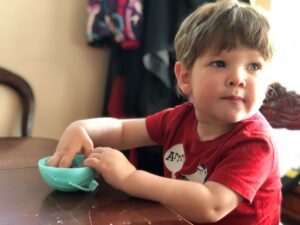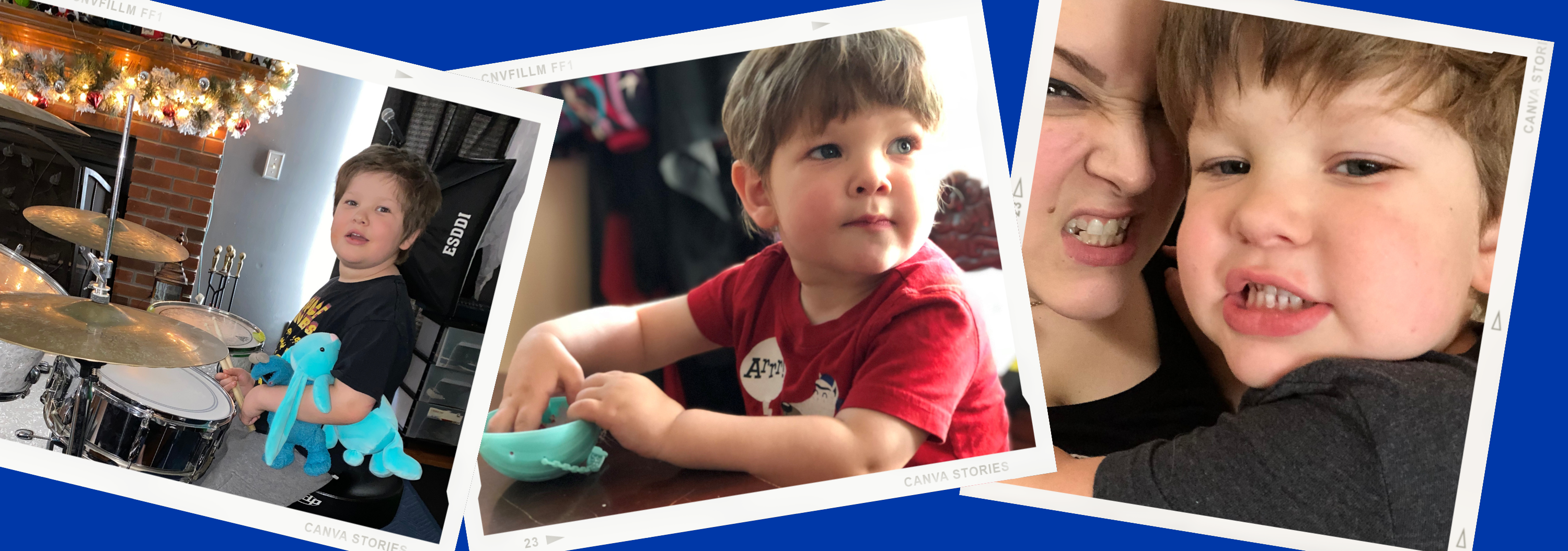A PEP Prentiss Parent Perspective
Autism Awareness
![]() By Deanna Moore, Communications and Marketing Director, Positive Education Program
By Deanna Moore, Communications and Marketing Director, Positive Education Program
Jude’s Trip to the Hospital
 “One day last week, when I woke Jude up for school, he couldn’t walk. Just out of the blue, he couldn’t even take one step. It was terrifying. First, I got his sister ready and took her to school, then, I got him ready and took him to the emergency room. I was all alone. I have a bad back but since he couldn’t walk, I had no choice but to carry him into the hospital. He weighs over 100 pounds. As I stepped over the threshold, I just collapsed. I just couldn’t carry him another step.”
“One day last week, when I woke Jude up for school, he couldn’t walk. Just out of the blue, he couldn’t even take one step. It was terrifying. First, I got his sister ready and took her to school, then, I got him ready and took him to the emergency room. I was all alone. I have a bad back but since he couldn’t walk, I had no choice but to carry him into the hospital. He weighs over 100 pounds. As I stepped over the threshold, I just collapsed. I just couldn’t carry him another step.”
This story was recently relayed to me by Jessica Orzechowski, the mother of one of our PEP Prentiss Autism Center students, Jude. I spoke to her for Autism Awareness Month and to learn a little bit more about the realities of caring for a child with autism. It’s difficult to imagine the emotional stress she was experiencing at the time — a single mom, caring for two children on the autism spectrum, whose youngest had suddenly lost the ability to walk. She explains that at the emergency department after she collapsed, they asked her to move her car, which was parked at the entrance. Without backup and knowing that six-year-old Jude did not do well with strangers, it felt like an impossible request. What also felt impossible was the next nine hours she spent trying to keep Jude calm while the hospital staff tried to solve the medical mystery he presented.
An Autism Metaphor
One of the things that struck me about this story was how well it could serve as a metaphor for so many aspects of caring for a child with autism. Many parents who have children on the autism spectrum say they feel alone. There isn’t enough awareness about autism, so their challenges aren’t always well understood, even by those close to them. Just like all parents, they want the best for their children, but giving them those opportunities often means pushing themselves to their own limits. And just when they feel like they can’t go another step, society asks more of them, expecting their family to function like families with neuro-typical children.
One very important note: Jude is fine. The walking situation had something to do with the way a cold virus impacted his body. He can walk again and has no lasting impacts from the ordeal.
In honor of Autism Awareness Month, PEP is highlighting Jessica’s story with an interview. Every story of a parent who has a child with autism is unique; however, there are also so many ways their stories overlap. Hopefully, her story will help heighten awareness about autism and perhaps it will make another parent struggling with similar issues feel less alone.
D: Tell me a little about Jude.
![]()
![]()
![]() J: He is just the cutest little thing. He’s all lips and hair. He laughs easily and is really affectionate. He knows when he is being naughty, and he will give you this sideways Popeye look. It’s funny. He also never stops. He moves like a humming bird – all energy, no rest.
J: He is just the cutest little thing. He’s all lips and hair. He laughs easily and is really affectionate. He knows when he is being naughty, and he will give you this sideways Popeye look. It’s funny. He also never stops. He moves like a humming bird – all energy, no rest.
D: What kind of things does he like?
J: His very favorite thing in the world is Cookie Monster. We have all these stuffed Cookie Monsters around the house that are the same, except one, which is all ragged and worn out. Every morning when he gets up, he must have “war-torn” Cookie Monster. The others just won’t do.
He also loves fish. He went with his class at PEP Prentiss to the aquarium a few weeks ago and I was afraid they would never get him to leave.
D: Tell me about how you found out Jude was on the autism spectrum.
J: There wasn’t one moment where I was like, “AHA!” It was a gradual accumulation of a lot of things. Everything about him was a little different – even his birth was strange. I had him tested as early as possible, at age three. The testing process was so stressful. They gave me this pile of paperwork and it was overwhelming. It took me like month and a half to complete it all.
I think it was when I was filling out that paperwork, that I really knew he was on the spectrum. It kept asking these questions, “Can your child stack blocks?” or “If you point at something across the room, does your child look at it?” I kept answering, no, no, no, no – and I knew.
D: What emotions did you have when you learned of the diagnosis?
J: It was so stressful and emotional. Mom-guilt is real. You just feel like it’s somehow your fault and it’s hard. It sucks. You know there’s nothing wrong with them, but you don’t want them to have a hard life. I just want him to have a happy life.
D: What do you wish people understood about autism?
J: There is nothing wrong with Jude. He is just neuro-divergent. But, that neuro-divergence means there are certain things he does that might seem unusual and certain things you shouldn’t do with him – like don’t approach him and try to touch him.
The behaviors you see with autism are so broad and vary depending on the person – it’s a spectrum – so it’s really hard to pin down one thing I wish people knew. But, when I think of our experience in the hospital, it’s a good example of how I wish there was just more awareness. We were in there for nine hours, nine hours with no food and nothing to do but sit. I had to try and keep him calm for so long and the staff just didn’t seem to understand that waiting this long was nearly impossible for us. Toward the end of our visit I knew that he was going to melt down after having to wait so long. I felt like, why do medically trained people not know that and why do I have to explain that? I just wished they had already known that.
D: Can you tell me about your experience at PEP?
J: It helps so much to have a team around you that understands what’s what. They send home notes every day, so I know what is going on. When my daughter was his age, she’d come home and tell me everything that was happening. Since Jude has limited language, I miss having those types of conversations with him. It’s nice I receive so much communication from staff. It’s such a good fit.
I also love that he gets to go on field trips. I used to think, “how can I ever trust people to take him out into the community?” but I can trust them at PEP. There are so many of them! I had to get like eight teacher presents at Christmas and I was like, “This is awesome!”
When I told Lea Kromer [clinical supervisor at PEP Prentiss] about our experience at the hospital, she told me if I had called, PEP could have sent someone out to help – someone to bring us food, someone to sit with him while I parked the car and stuff like that. Just knowing I have this team of support makes me feel less alone, less overwhelmed.
D: What are your hopes for Jude?
J: What are the hopes for any parent? I want him to be happy and fall in love. And I want him to get a job and be whatever he wants, an astronaut or a linebacker – well, with his build he’ll more likely be a linebacker! Of course, I want to hear him say, “I love you.” I want those milestones. I don’t want people to be mean to him. I want him to be safe.
More Information
More information about PEP Prentiss Autism Center is available on PEP’s website.
